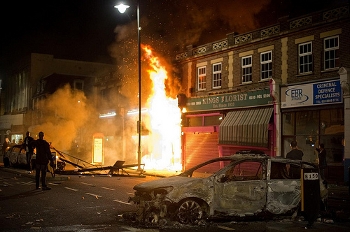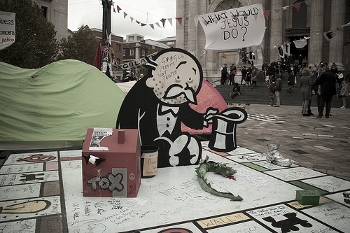 2011 has seen the streets of London dramatically occupied, first with the riots and looting that struck in August, and more recently with the tents of the Occupy LSX encampment. Rodney Barker argues that both forms of ‘street theatre’ are a response to the perceived ills of the modern economy.
2011 has seen the streets of London dramatically occupied, first with the riots and looting that struck in August, and more recently with the tents of the Occupy LSX encampment. Rodney Barker argues that both forms of ‘street theatre’ are a response to the perceived ills of the modern economy.
Two dramatic and apparently utterly contrasting presences burst onto the streets of London and other major cities in the United Kingdom in the summer and autumn of 2011; each of them a form of street theatre even if the character of the two dramas seemed very different. In August television and computer screens throbbed with images of rampaging youths carrying off lap tops, trainers, and small portable booty bundled out through smashed doors and windows. Rioting and looting destroyed shops and homes in a circle of London inner suburbs and the violence spread to other cities such as Manchester. Newspapers, with familiar exaggeration, carried headlines that London was in flames, even though for 99 per cent of streets life continued as peacefully as ever.
There is little that is new in the riots. City populations have again and again, and not only in Britain, rampaged and destroyed in a collective and public version of the unthinking and inarticulate rage that, at an individual level, breaks out as violence in the household or on the motorway. And as always, when public order is in abeyance, minor criminality and minor criminals take advantage to seize in full public sight what, in more orderly times, could only be seized covertly and in the dark.

The shock to the public mind thrust politicians into instant comment, condemnation and analysis, while longer and slower examination tried to explain what had happened by analysing the social composition of those who were brought before the courts, and those who were not. That analysis is continuing, though any data is qualified by the uncertainty as to how representative those subsequently arrested were of all those who took part in the disorder. It may well have been easier to charge those who were already known to the police.
But whilst there is still dispute about how many of the looters had previous criminal convictions, the relative poverty, deprivation, and unemployment of the areas where the looting happened and the people who carried it out, is not in dispute. The looters were heavily drawn not so much from, as the Justice Secretary Ken Clarke put it, a ‘feral underclass’ as from the sections of society most wounded by government policy.
There is no single or simple explanation of what happened, though plenty have been offered: poverty; criminality; gang culture; insensitive policing and a perception of police discrimination. But by their actions the looters and arsonists, of whom the greater part were young males, presented themselves as an alienated generation. Although the press talked of crowds of rioters, those involved were mostly in relatively small groups, hundreds not thousands, and often fairly closely co-ordinated on mobile phones and via social media. This is rather different from what one would think of as crowd behaviour. The technology enabled small groups to spread their message far and wide. There was a toxic combination of a section of the population which is socially alienated and excluded, but technologically integrated into a virtual society.
A government must show itself to be governing, and any failure to establish and maintain public order carried a huge and potentially fatal political cost. But it was under pressure not only to respond to the immediate crisis, but to solve the long term problem of alienated young males who see no moral impediment to looting and arson. Government’s abilities are limited here, and the most obvious measure is to increase social spending in all its dimensions, the very thing that the current government of the United Kingdom is ideologically and politically prevented from doing. The other long term measure, which is a sticking plaster rather than a cure, is to invest in policing in such a way that such outbreaks are impossible or difficult in the future, and that too imposes financial costs which the government is ideologically committed not to accept. The August days presented grave problems ahead not only for public order but for the government.

As late summer moved into autumn, the streets of the major cities were again dramatically occupied, but this time in what seemed an utterly different way. Occupy Wall Street, which quickly became Occupy Pretty Well Every Major Financial Centre, has spread across the northern hemisphere, and tents have blossomed in the square around or next to the banking and financial headquarters of cities from New York to London. We are presented with two kinds of street theatre, and each is a response to the ills of western economic life. Some of the looting rioters said they were against capitalism, but then attacked small family owned and run local shops. The Occupy demonstrators were far more nuanced. The garden of posters, banners, and manifestos around St Paul’s Cathedral in London certainly contained condemnations of capitalism, but there were also demands for the regulation of a system that had run totally out of control, not for the destruction of capitalism, but for civilising and moralising it. The looting and the camping are each a protest against and a stepping away from an economy which not only isn’t working, but which is condemned as corrupting social life and infecting the lives of ordinary citizens.
Whilst the police in the United Kingdom were caught unawares by the rioters, the settled presence of the Occupy demonstrators has given the authorities time to consider how they wish to respond. In London the financial government, but not the Church, is seeking the evict the camping demonstrators. In New York’s Zuccotti Park the police cleared away the hundreds of members of the public who were demonstrating their rejection of the ways in which the world’s economy is being run, and run down, and the people who are doing it. But the shutdown in New York may prove no more than a local repression, and has not dispersed the protestors. Occupy is already an international movement, and all the more difficult for governments to curtail because it doesn’t work by formal organisation, central committee, or any of the features of a conventional party or political association. You can’t join Occupy, except by occupying.
Policy action against the occupiers has been slow in coming, but when it arrived it was far more forceful than anything done against the looters of August. Why? The riots illustrated alienation. The occupation pointed a finger. Occupy is the articulate version of the alienation which in the riots and looting was opportunistic private rage. But whilst there is alienation from some of the dominating institutions of the contemporary economic world, and condemnation of the irresponsible looting at the top, what is happening is the very opposite of opting out of society. Occupy is an expression of citizenship, and a citizenship of action not formal, hollow enrolment. The only qualification for being a member, is acting as a member. And in the collective action, of citizens doing what Old Testament prophets did so well, speaking truth to power, there is a reassertion of equality.
The many discussion groups which take up a prominent part of the occupation make the pavements of London look and sound like university seminars. Or rather like university seminars where a more perfect equality is achieved or aspired to than in academia. Participants in Occupy do not interrupt, speak at great length nor do they express agreement or disagreement by voice, but by elaborate hand gestures. The tyranny of the loudest voice is thus replaced by the equality of participants.
Each of the street politics events announces a challenge to the way things are, the one inarticulate rage at government’s response to the economic crisis, the other calm condemnation of its causes. The call for reform will not be ended by law enforcement, merely contained, and avoided.
Please read our comments policy before posting.





Policy – in particular, Public Policy, needs to be redefined and enabled for the vast majority in the community who have been failed by poor policy-making decisions – whether from central government or otherwise. If Government, and the plan attached to the ‘big society’ ethos, are to be taken seriously, government need to do more to Enagage and Empower ‘ordinary’ people in communities – not least to introduce a platform whereby ‘ordinary’ people can have an opportunity to scrutinise policy aimed at Improving Upward Social Mobility.
Social Justice is at the HEART of all of the policies and lack of ‘Justice’ in redress for those who are Vulnerable and Disadvantaged in the community. Why is it that, if you are poor – thus unable to pay for a reasonable opportunity for redress to be sought – understand and enabled, the practice itself is almost very rarely achieved. However, if one has financial wealth, this type of aim for redress is almost always sudden – Lawyers working for the benefit of achieving a positive outcome for their client. But, why isn’t government so interest in learing from their own failings in policy and those who it fails too??